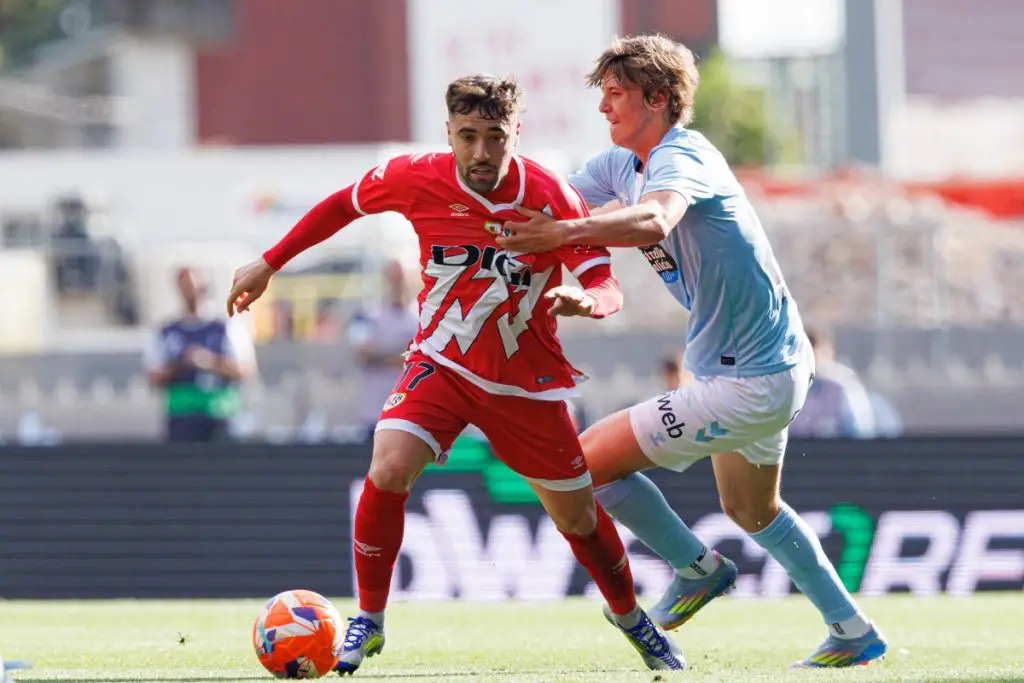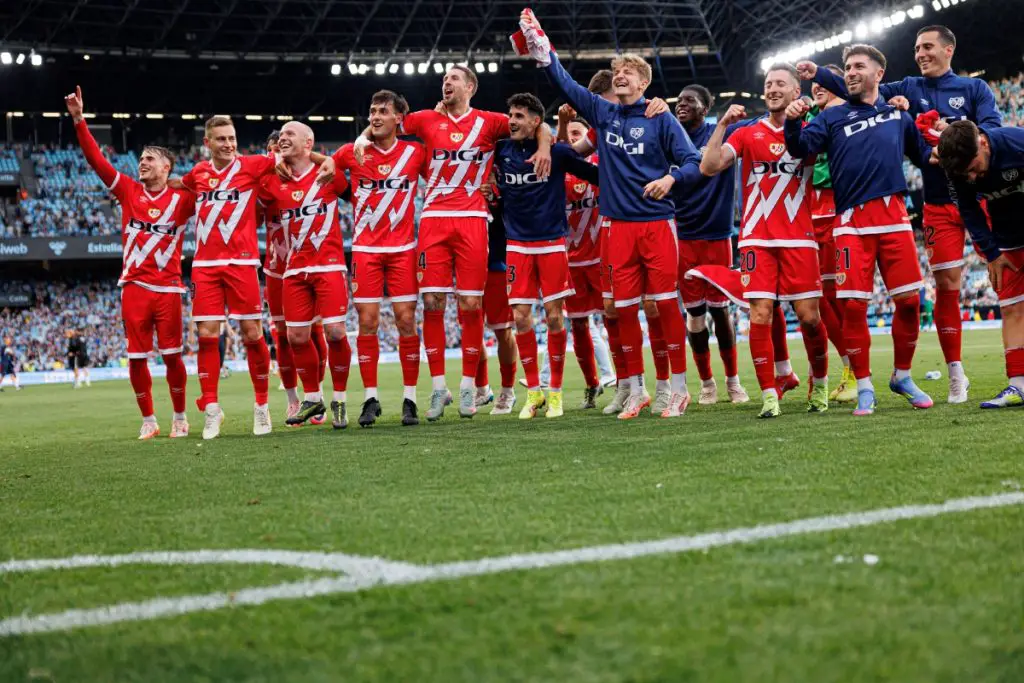LaLiga 2024/25 concluded at the weekend with jubilant scenes in two stadiums just 13 km apart, as Celta Vigo and Rayo Vallecano clinched European qualification for the first time in nine and 25 years respectively.
Celta, roared on by what was almost certainly the biggest away following of the Spanish top flight season, had to come from behind to see off Getafe 2-1 at the Coliseum. Almost inevitably, Iago Aspas was their final-day hero, with the veteran forward scoring the winning goal 10 minutes from time.
The 37-year-old has frequently saved his beloved club from relegation at this time of year, but this would have tasted so much sweeter than those moments, with Aspas’ goal capping a fantastic season for an otherwise youthful Celta squad.
With the Galicians taking care of their business, that left Rayo Vallecano and Osasuna in a straight fight for the Conference League place. Rayo just needed a win, but try as they might, they could not convert any of the clear opportunities they created against Jagoba Arrasate’s Mallorca in a game that ended goalless.
The tension levels inside the Estadio de Vallecas upped a few notches when news of a late Osasuna equaliser in Vitoria started to filter through. Vicente Moreno’s side still needed another goal though, and after an agonising wait for Rayo supporters, confirmation of the full-time whistle at Mendizorrotza sparked a pitch invasion in Madrid, as another fanbase basked in the glory of a thoroughly unexpected European qualification.

There’s a certain symmetry to the stories of Claudio Giraldez and Iñigo Perez. Born only a month apart in early 1988, they were both trusted to take charge of Primera Division clubs for the first time having just turned 36 in early 2024, with Perez taking the Rayo Vallecano job only four weeks before Giraldez was promoted to the Celta Vigo hotseat.
As tends to be the case whenever a new opportunity arises mid-season, both took over struggling teams, and both did well enough to keep their clubs up and ensure they’d be continuing for the 2024/25 campaign.
Giraldez has totally transformed Celta, signalling his intention to place his faith in young players from the off, and his policy of promoting locally-produced prospects from the B team has not only improved results on the pitch, but also helped to re-engage a fanbase that has had little to cheer since their last foray into Europe nearly a decade ago.
Perez, by contrast, has had less to work with, and has to a degree built on the success of his former boss Andoni Iraola, but he has done an absolutely stellar job in terms of getting the most out of a squad hampered by the absence of a convincing striker, and a lack of depth in some key positions.

More than a year on from their respective appointments, Giraldez and Perez still remain comfortably the youngest two coaches in the Spanish top flight.
Their respective success stories, and the relative struggles of some of the more experienced coaches in LaLiga in recent years, may even end up rewriting the playbook for many Spanish clubs when they approach the task of hiring a new boss.
The pair have shown that you don’t need bundles of coaching experience, or an illustrious playing career, to succeed at the top level. That may help to serve up more opportunities for a number of emerging young coaches over the coming years.
That being said, football is a notoriously fickle business, and it’s perhaps premature to judge these two as being destined for long and successful careers at the elite level, purely because of their impressive achievements this season.
Fans of LaLiga will most likely recall that there was a similar buzz around Diego Martinez when he guided Granada into Europe, and all the way to the quarter-finals of the Europa League in 2021.
Widely seen as the best young Spanish managerial prospect at the time, Martinez has since been sacked by Olympiacos, and has also overseen the lion-share of LaLiga seasons at Espanyol and Las Palmas which both ended in relegation.
That’s not to say he was fortunate at Granada, or has suddenly become a bad coach, but it is a reflection of just how quickly perceptions can change, and how the specific needs of each club can vary significantly.
In the cases of Celta Vigo and Rayo Vallecano when they made their changes last year, it wasn’t so much a case of taking a punt on a young coach, as it was about appointing the person best placed to meet the unique demands of the job.
In Vigo, while there were of course plenty of more experienced options, there was simply no other candidate as well-placed to tap into the rich talent pool that so clearly existed in a Celta B team that was pushing for promotion to the Segunda Division, at the same time the seniors were bidding to avoid relegation to the same league.
Whether Giraldez goes on to become a great coach or not, it’s pretty clear that he was the right man, at the right time, to revitalise a squad that was going nowhere fast under Rafa Benitez in the club’s centenary year.

It was a slightly different situation in Vallecas, with Rayo 14th in LaLiga when they sacked Francisco last February. While that position was by no means disastrous, there had been a noticeable decline following the successful years under Andoni Iraola, and the best-qualified man to come in and try to recapture some of that old identity, just happened to be somebody with no previous experience in a head-coaching role.
Critics of the Rayo hierarchy, of which there are many, might argue that the club should have just pushed for Perez, Iraola’s former assistant, when the Basque coach departed to take charge of Bournemouth in the summer of 2023.
While it wasn’t as though the exciting Iraola style returned overnight after Francisco’s exit last season, and while there are still subtle differences between the approaches of the two men, it’s again hard to imagine how anyone else could have taken over that Rayo Vallecano squad and done the kind of job that Perez has done this season, despite so many obvious limitations.
The new season will bring new challenges in both Vigo and Vallecas, but more than anything it will be greeted with excitement and joy when the first European visitors arrive.
There is even a sense that the two clubs might just have landed in the right competitions, with Giraldez’s constant rotation policy and use of many players likely to aid Celta’s adjustment to life in the Europa League.
Rayo would have likely struggled with the demands of juggling that competition with their domestic commitments, but the Conference League ought to offer a softer landing as they prepare for only their second ever European campaign.
While you can never be certain what’s lingering just around the corner in football, fans of Celta and Rayo can certainly enjoy this moment and look forward to what’s to come, with both clubs reaping the rewards from the calculated gambles they made on young coaches at the beginning of last year.





/https%3A%2F%2Fsportsmole-media-prod.s3.gra.io.cloud.ovh.net%2F24%2F51%2Fansu-fati.jpg?w=350&resize=350,250&ssl=1)






/https%3A%2F%2Fsportsmole-media-prod.s3.gra.io.cloud.ovh.net%2Fuploads%2F2025%2F11%2Fns-2-photo-frame-email-sportmole-13-69158caf02c2e196716551.jpg?w=120&resize=120,86&ssl=1)


